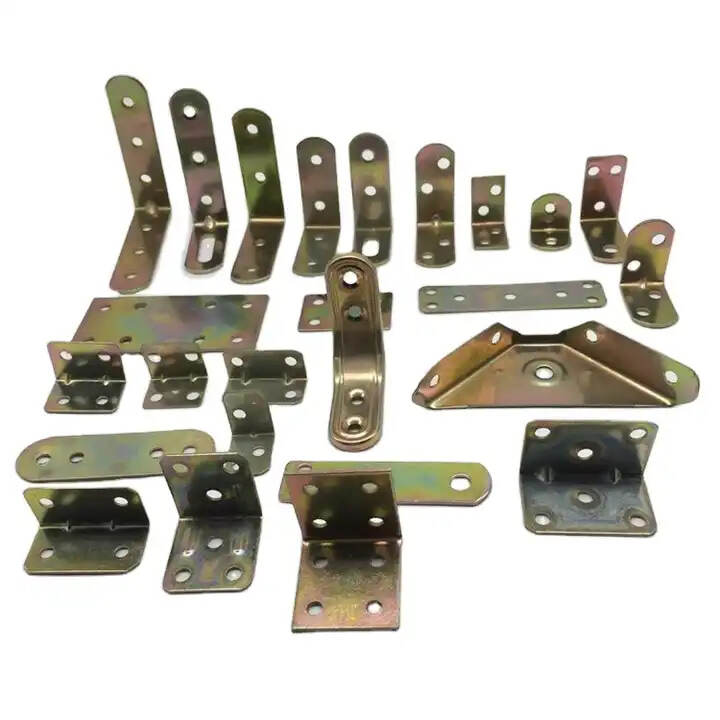The global metal stamping industry continues to evolve rapidly, with technological advancements and market demands driving innovation across manufacturing sectors. As we enter 2025, businesses seeking reliable partners for their stamping parts requirements face an increasingly competitive landscape filled with specialized manufacturers offering diverse capabilities. From automotive components to aerospace precision parts, the demand for high-quality stamping parts has never been greater, making the selection of the right manufacturing partner crucial for project success.

Metal stamping manufacturing represents one of the most efficient methods for producing complex metal components at scale, combining precision engineering with cost-effective production processes. The industry has witnessed significant consolidation and specialization, with leading manufacturers investing heavily in advanced equipment, quality management systems, and sustainable production practices. Understanding which companies lead this competitive market becomes essential for procurement professionals, engineers, and business decision-makers seeking optimal manufacturing solutions.
Industry Leaders in Progressive Stamping Technology
Advanced Manufacturing Capabilities
The foremost manufacturers in the stamping parts industry distinguish themselves through their investment in progressive die technology and automated production systems. These companies typically operate state-of-the-art facilities equipped with high-speed presses ranging from 50 to 2000 tons capacity, enabling them to handle projects from prototype development through high-volume production runs. Their expertise spans multiple industries, including automotive, electronics, appliances, and industrial equipment manufacturing.
Leading stamping manufacturers have embraced Industry 4.0 principles, integrating IoT sensors, predictive maintenance systems, and real-time quality monitoring throughout their production processes. This technological integration allows for consistent part quality, reduced waste, and improved delivery performance. Many top-tier companies maintain multiple manufacturing locations strategically positioned to serve global markets while providing localized support and shorter lead times.
Quality Certification and Standards Compliance
Premium stamping parts manufacturers maintain rigorous quality management systems, typically holding certifications such as ISO 9001, TS 16949 for automotive applications, and AS9100 for aerospace components. These certifications reflect their commitment to consistent quality delivery and continuous improvement processes. Additionally, many leading companies have achieved environmental certifications like ISO 14001, demonstrating their dedication to sustainable manufacturing practices.
The most respected manufacturers in this space invest significantly in metrology equipment, including coordinate measuring machines, optical comparators, and statistical process control systems. This investment ensures that stamping parts meet increasingly tight tolerances and complex geometrical requirements demanded by modern applications. Their quality laboratories often provide full material traceability and comprehensive testing services, including tensile testing, hardness verification, and surface finish analysis.
Specialized Manufacturing Segments
Automotive Stamping Excellence
The automotive sector represents the largest market segment for stamping parts, with specialized manufacturers focusing exclusively on this demanding industry. These companies typically produce body panels, chassis components, brackets, and various structural elements that must meet stringent safety and performance requirements. Their capabilities often include hot stamping processes for ultra-high-strength steels, aluminum stamping for lightweighting initiatives, and complex multi-stage progressive operations.
Automotive-focused stamping manufacturers maintain close relationships with major OEMs and Tier 1 suppliers, often participating in early design phases to optimize part manufacturability and cost-effectiveness. Their engineering teams possess deep expertise in crash performance, corrosion resistance, and assembly line compatibility. Many of these companies operate dedicated facilities near major automotive manufacturing hubs, ensuring responsive supply chain support and reduced logistics costs.
Precision Electronics and Appliance Components
Another significant segment comprises manufacturers specializing in smaller, high-precision stamping parts for electronics, appliances, and industrial equipment applications. These companies excel in fine blanking, micro-stamping, and precision forming operations that produce components with exceptional dimensional accuracy and surface finish quality. Their expertise extends to working with various materials, including copper alloys, stainless steels, and specialty metals used in electronic applications.
Electronics-focused stamping manufacturers often provide additional services such as plating, heat treatment, and assembly operations to deliver complete solutions to their customers. Their production facilities feature climate-controlled environments and cleanroom capabilities to meet the stringent requirements of electronic component manufacturing. These companies frequently invest in vision inspection systems and automated handling equipment to maintain consistent quality while managing high-volume production requirements.
Geographic Manufacturing Hubs
North American Manufacturing Centers
North America hosts several world-class stamping parts manufacturers, particularly concentrated in the Great Lakes region where automotive manufacturing remains strong. These companies benefit from proximity to steel suppliers, skilled workforce availability, and established supply chain networks. Many have expanded their capabilities to serve diverse industries beyond automotive, including aerospace, defense, and industrial equipment sectors.
Leading North American manufacturers have invested heavily in automation and advanced manufacturing technologies to remain competitive with global suppliers. Their focus on lean manufacturing principles, combined with shorter supply chains and responsive customer service, provides significant advantages for customers requiring quick turnaround times and engineering support. These companies often maintain research and development partnerships with universities and technology centers to drive innovation in stamping processes and materials.
Asian Manufacturing Powerhouses
Asia, particularly China, Japan, and South Korea, represents a major center for stamping parts manufacturing, with several companies achieving global recognition for their scale, technology, and cost competitiveness. Japanese manufacturers are renowned for their precision and quality management systems, while Chinese companies have rapidly expanded their capabilities and global market presence through strategic investments in technology and international partnerships.
Asian stamping manufacturers often provide comprehensive manufacturing services, including tool and die development, prototyping, and volume production under one roof. Their ability to scale production quickly and efficiently makes them attractive partners for companies requiring large volumes of stamping parts at competitive pricing. Many have established international sales offices and technical support centers to better serve global customers and provide localized engineering assistance.
Technology Innovation and Future Trends
Advanced Material Processing
The stamping industry continues to evolve with the introduction of advanced materials and processing techniques that enable manufacturers to produce more complex and higher-performance components. High-strength steels, aluminum alloys, and composite materials require specialized forming techniques and tooling strategies that leading manufacturers have mastered through extensive research and development investments.
Many top-tier stamping companies have developed expertise in hot forming processes, which allow for the production of ultra-high-strength components while maintaining precise dimensional control. These processes are particularly valuable in automotive applications where safety requirements demand exceptional strength-to-weight ratios. Additionally, manufacturers are exploring additive manufacturing techniques for rapid tooling development and complex geometries that traditional stamping cannot achieve.
Digitalization and Smart Manufacturing
The integration of digital technologies throughout the manufacturing process has become a key differentiator among leading stamping parts manufacturers. Companies are implementing comprehensive digital twins of their production processes, enabling virtual optimization and predictive maintenance capabilities. These systems provide real-time visibility into production status, quality metrics, and equipment performance.
Smart manufacturing initiatives extend beyond the production floor to include supply chain integration, customer portals for order tracking, and automated quality reporting systems. Leading manufacturers are leveraging artificial intelligence and machine learning algorithms to optimize production schedules, predict maintenance requirements, and identify potential quality issues before they impact production. These technological investments enable higher efficiency, reduced costs, and improved customer satisfaction.
Selection Criteria for Manufacturing Partners
Technical Capabilities Assessment
When evaluating potential stamping parts manufacturers, companies should conduct thorough assessments of technical capabilities, including equipment capacity, tooling expertise, and material handling capabilities. The most capable manufacturers maintain diverse press sizes and configurations, enabling them to handle projects ranging from small precision components to large structural parts requiring significant forming forces.
Engineering support capabilities represent another critical evaluation factor, as the best manufacturers provide comprehensive design assistance, manufacturability analysis, and cost optimization recommendations. Their engineering teams should demonstrate experience with relevant industry standards, material specifications, and testing requirements. Additionally, manufacturers with in-house tooling design and manufacturing capabilities often provide better cost control and faster project turnaround times.
Supply Chain Integration and Support
Modern stamping parts manufacturers increasingly offer comprehensive supply chain solutions that extend beyond basic manufacturing services. These capabilities include material sourcing, inventory management, just-in-time delivery programs, and secondary operations such as assembly, packaging, and logistics coordination. Companies providing these integrated services can significantly simplify procurement processes and reduce total project costs.
The ability to support global supply chains through multiple manufacturing locations and established distribution networks has become increasingly valuable for companies operating in multiple markets. Leading manufacturers maintain quality consistency across all facilities while providing localized support and reduced shipping costs. Their established relationships with material suppliers, finishing services, and logistics providers enable comprehensive project management and single-source accountability.
FAQ
What factors should be considered when selecting a stamping parts manufacturer
Key selection factors include technical capabilities, quality certifications, production capacity, geographic location, and total cost of ownership. Companies should evaluate the manufacturer's experience with similar applications, their ability to meet volume requirements, and their track record for on-time delivery. Additionally, consider their engineering support capabilities, tooling expertise, and ability to provide value-added services such as assembly or finishing operations.
How do leading manufacturers ensure consistent quality in stamping parts production
Top manufacturers implement comprehensive quality management systems that include statistical process control, regular equipment calibration, and thorough inspection procedures. They invest in advanced metrology equipment, maintain detailed material traceability records, and conduct regular audits of their processes. Many also employ real-time monitoring systems that can detect variations and automatically adjust process parameters to maintain consistent part quality throughout production runs.
What are the advantages of working with manufacturers that offer integrated services
Integrated service providers can significantly simplify supply chain management by offering design assistance, tooling development, manufacturing, finishing, and logistics under one contract. This approach often results in better cost control, improved communication, faster problem resolution, and reduced administrative overhead. Additionally, single-source providers typically offer better accountability and can optimize the entire production process for efficiency and quality.
How is technology changing the stamping parts manufacturing industry
Advanced technologies including automation, artificial intelligence, and IoT integration are transforming stamping manufacturing through improved efficiency, quality control, and predictive maintenance capabilities. Digital twin technology enables virtual process optimization, while smart manufacturing systems provide real-time visibility and control. These technological advances enable manufacturers to produce higher quality parts more efficiently while reducing costs and environmental impact.
Table of Contents
- Industry Leaders in Progressive Stamping Technology
- Specialized Manufacturing Segments
- Geographic Manufacturing Hubs
- Technology Innovation and Future Trends
- Selection Criteria for Manufacturing Partners
-
FAQ
- What factors should be considered when selecting a stamping parts manufacturer
- How do leading manufacturers ensure consistent quality in stamping parts production
- What are the advantages of working with manufacturers that offer integrated services
- How is technology changing the stamping parts manufacturing industry

